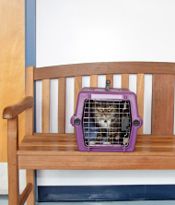Irritable Bowel Syndrome
Information to help with symptoms of irritable bowel syndrome (IBS) in cats and dogs.
Select a Topic

What is IBS?
IBS, or irritable bowel syndrome is a fairly common condition in both cats and dogs. IBS simply refers to a group of gastro-intestinal disorders that causes irritation and inflammation of the mucous membranes of the digestive tract and can occur in the large intestine (colitis), the small intestine (enteritis), or the stomach (gastritis).
This results in a number of digestive upsets including abdominal pain, constipation, chronic diarrhea, nausea and vomiting, bloating, and flatulence. In some cases, pets start to lose their appetite and weight-loss can result.
What Causes IBS?
As with human irritable bowel syndrome, the cause of IBS in pets is not fully understood. There do however seem to be a number of contributing factors which seem to exacerbate the condition.
These include poor diets, stress, allergies (particularly food allergies), and continual use of antibiotics, as well as viral and bacterial infections, and parasites. If your pet displays signs of IBS then a veterinary consult is necessary. While IBS is seldom life threatening, it is important to rule out other serious conditions and to help manage your pet’s unpleasant and uncomfortable symptoms.
Help for IBS
Natural Remedies
Tips for IBS
- The first thing to consider if your pet has IBS is the diet they are currently eating. Many pets have intolerance to certain ingredients in their food and you may need to experiment with a variety of diets before finding one that suits your pet’s needs. Opt for high quality, balanced diets filled with unprocessed foods.
- When we think of our pet’s diets, we often don’t factor in the treats, table scraps and human foods they so often eat. Avoid feeding your pet human food where possible and eliminate all treats and table scraps until you have the IBS under control. Among the things that have been frequently known to trigger IBS in pets include diets high in fats, spicy foods, processed foods, dairy products, preservatives and sugar.
- Some pets are sensitive to the chemicals and heavy metals so often found in tap water. Try to substitute the tap water in your pet’s drinking bowel for filtered or bottled water.
- Parasites are a common trigger for IBS, especially in young pets. Make sure you treat your pet for parasites if you think this to be a possible cause. Pets should be de-wormed every 3 – 6 months
- Help your pet to de-stress as stress is a common cause of IBS. Pets often pick up on our stress and so the first step in reducing your pet’s stress is to manage your own. Anxious and shy pets are also extremely sensitive to change and may need a few extra measures to help calm them.
